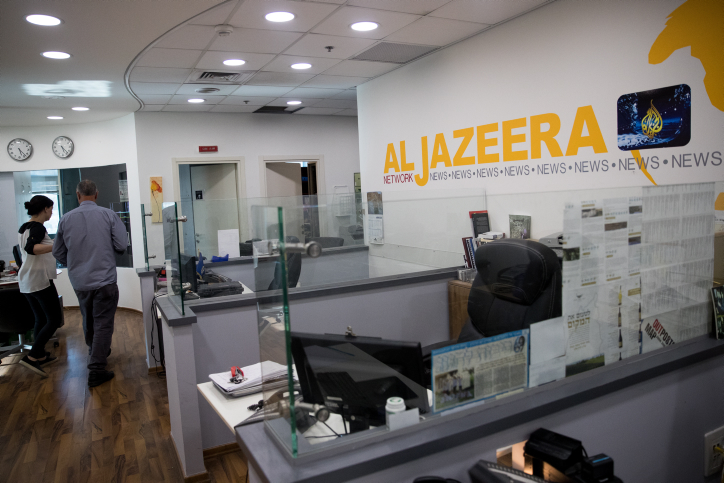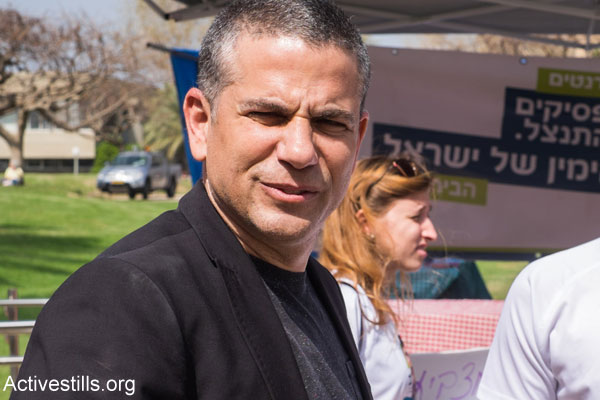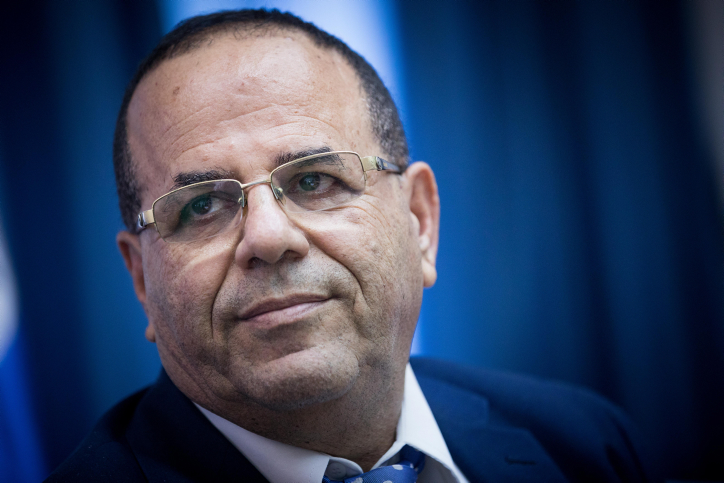The Government Press Office is trying to rescind Elias Karram’s press credentials after he expressed support for the Palestinian cause. It hasn’t done the same for uniformed Israeli-soldier reporters.

Israel’s Government Press Office announced Wednesday that it was revoking press credentials from a senior Al Jazeera reporter in the country.
The GPO cited a statement he allegedly made over a year ago as its reason for revoking the credentials of Elias Karram, a Palestinian citizen of Israel from Nazareth. “As a Palestinian journalist in an occupied area or in a conflict zone, media work is an integral part of the resistance and its educational political activity,” Karram said in an Arabic-language May 2016 interview. “The journalist fulfills his role in the opposition with the pen, voice or camera because he is part of this people and he carries out resistance in his unique way.”
The final decision on Karram’s case depends on the outcome of a formal hearing.
In a statement announcing the revocation of Karram’s credentials, GPO Director Nitzan Chen asserted that journalists with a GPO card are required to follow the “rules of ethics and universal fairness regarding news reporting,” and that “whoever takes an active part in a political struggle” must do so without a GPO card.
A review of the GPO’s own rules for the provision of press cards, however, makes no mention of ethics or fairness.
Who is a legitimate journalist?
Carrying a GPO card gives journalists access to official events, the scenes of newsworthy incidents, is often a condition for cooperation from official spokespeople, and offers protection from arrest while covering protests. In other words, government accreditation makes reporting much safer and more effective. (Foreign journalists must have the GPO’s endorsement in order to even receive a visa to work in Israel.)
But by giving itself the power to decide who is a legitimate journalist, the GPO (which operates as part of the Prime Minister’s Office) also inherently gets to decide who is not a legitimate journalist. And as with any decision made by government bureaucrats subordinate to politicians, such decisions can at times be driven by political considerations.
But the GPO is not only an office charged with accrediting and liaising with journalists. It is also a political propaganda organ of the Israeli government. According to a December 2014 Knesset report on official hasbara (propaganda) efforts, “The GPO tries to promote the State of Israel’s hasbara in its work with the foreign press,” an effort on which it spent NIS 36.5 million between 2010 and 2014.
In other words, the body that is threatening to revoke a Palestinian’s press credentials for identifying with a national cause — is itself a full-fledged participant in the State of Israel’s national propaganda effort.
A double standard
Despite singling out Karram for what it terms violations of ethical and fairness standards, the GPO has never threatened the journalists and editors of Israel Hayom for their unwavering loyalty to Benjamin Netanyahu. The editors of Yedioth Ahronoth and its website, Ynet, have never been threatened for publishing sponsored content as news, or been summoned to a hearing over the now-infamous offer made by Yedioth publisher Noni Mozes to give Netanyahu favorable coverage in exchange for political favors.

Political party affiliated newspapers, such as those serving the ultra-Orthodox or Arab communities, do not face similar treatment (aside from newspapers affiliated with the Islamic Movement, which were shut down by order of the defense minister). Yinon Magal, former editor-in-chief of the Walla! news site, did not have his GPO card revoked after he declared himself to be, “first and foremost Israeli, and a journalist second.”
The GPO does not demand that uniformed Israeli-soldier reporters for Army Radio, who are subject to the military chain of command, disavow their role in the Israeli national struggle in order to receive government press accreditation.
As opposed to Israel Hayom, Yinon Magal, and the soldiers of Army Radio, Karram’s only crime is that in the eyes of the government, he is simply the wrong kind of patriot. To be an Israeli patriot first and a journalist second is fine. But to be a patriot of a people trying to free itself of occupation, and using your pen in order to promote freedom and equality? That’s where Chen draws the line.
Let’s be very clear: the GPO is not accusing Karram of anything but patriotism. It is not accusing him of violence or incitement, nor is it claiming that he did anything illegal. The GPO, which is a part of and subordinate to the Israeli Prime Minister’s Office, is simply taking advantage of its power to determine who is and who isn’t considered a journalist — in order to dictate what types of patriotism are legitimate.
An orchestrated attack

The GPO has publicly tied the campaign against Karram to attempts by Communications Ministry Ayoub Kara to shut down Al Jazeera’s operations in Israel entirely — an attempt that was roundly criticized by the Union of Journalists in Israel.
The Union of Journalists in Israel issued a statement condemning the GPO’s decision Wednesday night, calling on the GPO to retract its decision (Full disclosure: I am a member of the Union’s secretariat):
“[The] arguments made for revoking the pass, as laid out in the GPO’s statement, are intolerable in a democratic country. Journalists are not simply stenographers, they often act to promote an agenda in accordance with the interests of the public as they see fit, while remaining subject to the Israeli Press Council’s code of ethics. It is inconceivable that the state would impede a journalist’s ability to report simply because of his agenda, regardless of how critical it is of the state.”
The GPO’s attempts to discredit Karram must be seen in the context of a well-orchestrated assault on freedom of the press in Israel. Over the past few years, the government has shut down Palestinian news outlets on both sides of the Green Line and imprisoned journalists without charge or trial. In addition, Israeli police and soldiers regularly assault, shoot at, and detain journalists working in the field.
Michael Schaeffer Omer-Man contributed to this article. A version of this article also appears in Hebrew on Local Call. Read it here.

